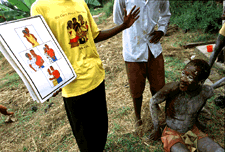

Lastly, more peer education programs should be encouraged in the region. Research on the effect of peer and adult communication on AIDS-protective behaviors among Ghanaian youth indicate that peers substantially influence the attitudes of their contacts (who are usually other peers) towards HIV/AIDS prevention7. Therefore, right at the beginning of the school term, when schoolwork is not as intense, students can be recruited from both junior and senior secondary schools in order to be trained as peer educators/counselors. They will be taught the same material that is to be taught at the seminars, and will be given certificates of participation at the end of the entire workshop. The same personnel that were used to conduct the seminars can also be used to run these workshops, thus, eliminating the cost of training new personnel. The main purpose of training students as peer educators is to empower them with knowledge that they can impart to their fellow colleagues in informal settings.

Even though cost estimates for this intended line of action are not available, considering the simplicity and arguable effectiveness of the whole process, I think it would be worth a try. HIV/AIDS has many enemies in sub-Saharan Africa; however if mere talk about stopping the spread of the disease does not change into action, this generation, will have a lot to answer for.